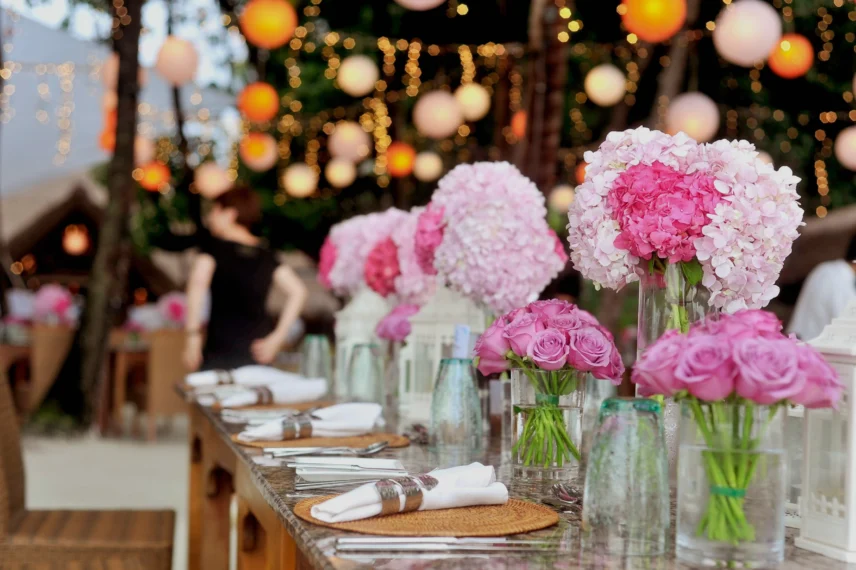Common Wedding Questions Answered

Planning a wedding can be both exciting and overwhelming. With so many details to consider, it’s natural to have questions. Here are some of the most common wedding questions couples ask, along with helpful answers to guide you through the process.
1. How do we set a budget?
Setting a budget is one of the first steps in wedding planning. Start by determining how much you can afford to spend and who will contribute. Break down your budget into categories such as venue, catering, attire, flowers, and entertainment. It’s wise to allocate a portion of your budget for unexpected expenses, as costs can sometimes exceed initial estimates.
2. How much should you spend on a wedding?
The amount you should spend on a wedding varies widely based on factors such as location, guest count, and personal preferences. In the UK, the average cost of a wedding can range from £20,000 to £30,000, but many couples manage to have beautiful weddings for less. It’s essential to set a budget that reflects your financial situation and priorities. Consider what aspects of the wedding are most important to you and allocate your budget accordingly.
3. When should we start planning?
The ideal time to start planning your wedding is at least 12 to 18 months before the big day. This allows ample time to secure your desired venue, book vendors, and make necessary arrangements. If you’re planning a smaller wedding or a more straightforward event, you may be able to plan in a shorter timeframe.
4. What is the 30-5 minute rule for weddings?
The 30-5 minute rule is a guideline for wedding planning that suggests you should aim to have your ceremony start 30 minutes after your guests are scheduled to arrive. This allows for a buffer period for guests to settle in and ensures that the ceremony can start on time. Additionally, it’s recommended to keep the ceremony itself to about 5 minutes for a quick and engaging experience, especially for smaller or more casual weddings. However, this rule can be adjusted based on the couple’s preferences and the overall style of the wedding.
5. How do we choose a venue?
When selecting a venue, consider factors such as location, capacity, and style. Visit multiple venues to get a feel for the space and ask about their packages and services. Think about the atmosphere you want to create and whether the venue aligns with your vision. Additionally, check for availability on your preferred date.
6. How to spend £1000 on a wedding?
Spending £1000 on a wedding requires careful planning and prioritisation. Here are some suggestions on how to allocate that budget:
- Venue: Look for affordable or free venues, such as parks, community halls, or even a backyard.
- Attire: Consider renting wedding attire or purchasing second-hand dresses and suits.
- Catering: Opt for a buffet or potluck-style meal, or consider food trucks for a more casual approach.
- Photography: Hire a budding photographer or ask a friend with photography skills to capture the day.
- Flowers: Choose seasonal flowers or DIY your arrangements with the help of friends.
- Decorations: Keep it simple with DIY decorations or minimalistic designs.
- Invitations: Use digital invitations to save on printing costs.
By prioritising essential elements and being resourceful, you can create a memorable wedding within a limited budget.
7. What is the best time of year for a wedding?
The best time for a wedding often depends on personal preference and budget. Spring and autumn are popular for their mild weather and beautiful scenery. However, summer weddings can offer vibrant outdoor settings, while winter weddings can provide a magical, festive atmosphere. Keep in mind that peak wedding seasons may come with higher costs and limited availability.
8. Do brides still pay for weddings?
Traditionally, brides and their families were expected to cover the costs of the wedding. However, modern practices have evolved, and many couples now share the financial responsibilities. It’s common for both partners and their families to contribute to the wedding expenses. Ultimately, how costs are divided should be discussed openly between the couple and their families to ensure everyone is comfortable with the arrangements.
9. How many guests should we invite?
The number of guests you invite will largely depend on your budget and venue capacity. Start by creating a preliminary guest list, including close family and friends. Consider whether you want an intimate gathering or a larger celebration. Remember that the more guests you invite, the higher your costs will be for catering, seating, and other services.
10. What is the 80-20 rule for weddings?
The 80-20 rule in wedding planning suggests that 80% of the results come from 20% of the efforts. In the context of weddings, this means that focusing on the most impactful elements—such as the venue, catering, and guest experience—can lead to a successful event without getting bogged down by less significant details.
11. When should a bride get hair and makeup done?
A bride should typically schedule hair and makeup to be completed about 1.5 to 2 hours before the ceremony starts. This allows time for any last-minute adjustments and ensures that the bride is ready and relaxed before the event begins. It’s also a good idea to have a trial run of the hair and makeup before the wedding day to ensure everything goes smoothly. Additionally, coordinating with the bridal party’s hair and makeup schedules can help keep the day on track.
Conclusion
Planning a wedding involves many decisions and details, but addressing these common questions can help simplify the process. Remember to communicate openly with your partner and enjoy the journey as you prepare for your special day. With careful planning and consideration, your wedding can be a beautiful celebration of love and commitment.





Comments